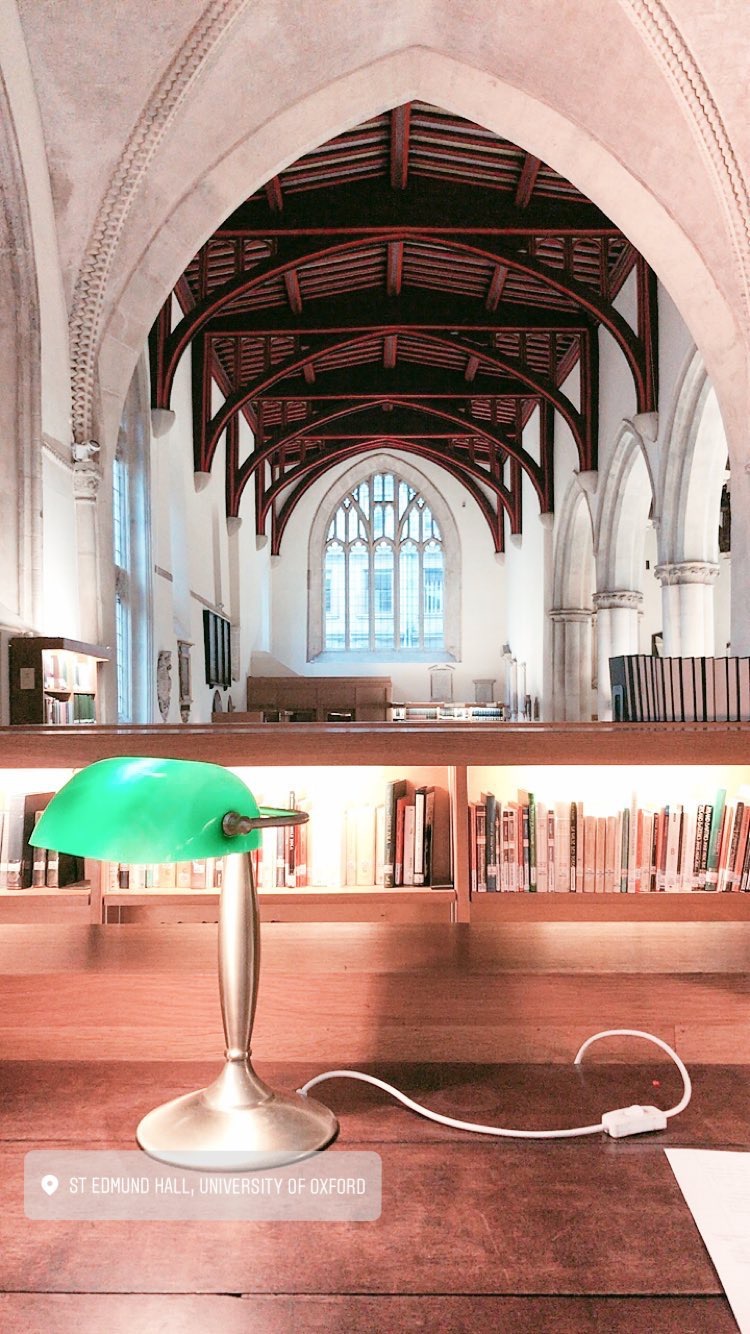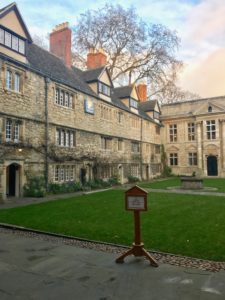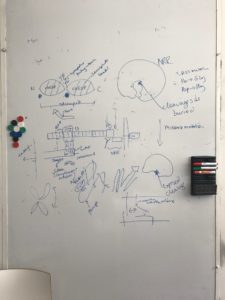STEMing Abroad!


I remember turning up an extra ten minutes early and as I stood outside my professor’s office, and I was super nervous—what was my first tutorial at Oxford going to be like?
By Sophomore year, I knew I wanted to study abroad, but because most of my college’s programs were generally catered for Engineering students, I was worried I wouldn’t be able to take the relevant courses in my major and be able to graduate on time.

Yes, I could fulfill my other requirements, but I REALLY wanted to be able to take as many biology courses as I can over my four years of undergraduate. Almost by a stroke of luck, the study abroad fair was held only a couple of days after I had a firm idea of my decision to study abroad.
I was amazed by the variety of programs that were out there, and I was immediately drawn by IFSA’s Oxford University program—I am going to be able to attend lectures and classes at Oxford!
Just like that, my journey began—I enrolled as a visiting student at St. Edmund Hall (affectionately called Teddy Hall) at Oxford, a small, cozy and friendly college near the city center—as a Biochemistry and Biomedical Sciences student.
Navigating Lectures
Because I had a way more flexible study schedule, I had time to explore and attend lectures from the different departments. There was an entire list of ongoing lectures for each day that was posted on an online scheduler, for the Year 1, 2, and 3s—equivalent of freshman, sophomore and junior/senior years. Oxford’s undergraduate lasts only three years, so the curriculum is much more compact, and each student is only studying his or her own specific subject for all three years!
I remember spending at least a good hour before each week begun, scrolling through and selecting the lectures I really wanted to go to. I was spoilt for choice—I appreciated the insights into the hallmarks of cancer, pathogenesis of viral infections, principles of transplantation and drug discovery processes, in addition to the discussions of medical research ethics.
I jumped between the Biochemistry lectures, and those meant for medical students, and so my morning was usually packed. The lectures paid a good amount of detail and attention to the historical derivations of the concepts. Each lecturer was the expert in the area, so we were able to also appreciate some of the laboratory data and latest developments in the field, in addition to understanding basic concepts.
In the afternoon, there were seminar-styled classes, catered for the Year 3s, which focused on integration and application of knowledge. The professors picked scientific literature, and we discussed the results, pointing out also some of the flaws in the research design or data presentation.
Experiencing my First Tutorials!

I also had tutorials—something that is unique to the Oxford-Cambridge experience. It is essentially a one-to-one class with a tutor at Teddy Hall. It is usually an hour and half of intense academic discussions and idea-exchange between you and your tutor, based on the essay topic that was assigned a week earlier.
I’ve had essays that focused on the mechanisms and pathways of bacterial infections, second messengers and cascades, importance of metals in biology, chemiosmotic principle, electron transport and oxidative phosphorylation, just to name a few.
At each tutorial session, my tutors made sure I understood every single concept, cleared my misconceptions and confirmed that I was absolutely certain about what I had written in my essays before I left their office. I appreciated the level of interaction and engagement I was able to have with each of my tutors, and I always left their office motivated and wanting to learn more!
But lab?
There was one downside…because I was in the semester program, I essentially joined the Oxford academic year in their second term, given that their schedules split the year into three terms instead of the two semesters we’re used to back here. That means that all the lab sessions have already been planned and there was no way visiting students could squeeze in. I really love research and labs, and I view it almost like a quintessential part of any science experience I have!
There was no way I was going to give up on that just because I was abroad—I had to keep “lab-ing”. So, I reached out to my tutors, but unfortunately, they had no space in their labs. I was persistent in my search and did not want to give up, and eventually managed to secure a short 3-4 weeks internship at a research institute during the Easter break, which is, a 6-week break in between the two terms I’ve had in Oxford. I’ve also had friends who managed to get a spot in their tutor’s labs, and they substituted a course for the lab hours instead, which worked out great.
Despite not being able to be in a lab during term time, I had full-time, hands-on experiment experiences during the break, and I was able to immerse myself in the lab environment. It was almost like a sneak-peak into graduate life at Oxford!
I worked in an immunology lab and focused on T-cell receptor sequencing. I worked on a project on the characterization of antigen specific T cells isolated from influenza-infected or cancer patients. I successfully clones and sequenced the T cell receptor of influenza-specific and tumor antigen-specific T cells, evaluated the function of T cell clones to identify the “good” T cell receptors for disease control, and also designed protein expression constructs for making peptide-MHC class I complex which will be used for isolating HBV-specific T cells from hepatocellular carcinoma patients.
This has been a tremendous opportunity, and now as I think about my next steps and begin my applications for graduate school, I am extremely grateful for taking the extra step in reaching out! STEM-ing abroad may be a less taken path for many students given the limited choices in courses and perhaps also the lack of lab components, but I think I have managed to turn things around and create an absolutely amazing experience. You can too!
Chenyu Z. | Biology and Economics student | Lafayette College | University of Oxford Partnership | Spring 2018